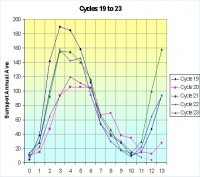By Walter Cunningham, NASA Apollo 7 Astronaut
NASA has played a key role in one of the greatest periods of scientific progress in history. It is uniquely positioned to collect the most comprehensive data on our biosphere. For example, recently generated NASA data enabled scientists to finally understand the Gulf Stream warming mechanism and its effect on European weather. Such data will allow us to improve our models, resulting in better seasonal forecasts. NASA’s Aqua satellite is showing that water vapor, the dominant greenhouse gas, works to offset the effect of carbon dioxide (CO2). This information, contrary to the assumption used in all the warming models, is ignored by global warming alarmists.
Climate understanding and critical decision making require comprehensive data about our planet’s land, sea, and atmosphere. Without an adequate satellite system to provide such data, policy efforts and monitoring international environmental agreements are doomed to failure. Our satellite monitoring capability is being crippled by interagency wrangling and federal budget issues. As much as a third of our satellites need replacing in the next couple of years. NASA should be at the forefront in the collection of scientific evidence and debunking the current hysteria over human-caused, or Anthropogenic Global Warming (AGW). Unfortunately, it is becoming just another agency caught up in the politics of global warming, or worse, politicized science. Advocacy is replacing objective evaluation of data, while scientific data is being ignored in favor of emotions and politics.
There are excellent correlations between the regular fluctuations of the Sun and the Earth’s temperature, while scientists cannot find a relationship between industrial activity, energy consumption, and global temperatures. But global warming is an issue no longer being decided in the scientific arena. Saying the Earth is warming is to state the obvious. Since the end of the ice age, the Earth’s temperature has increased approximately 16 degrees Fahrenheit and sea levels have risen a total of 300 feet. That is certain and measurable evidence of warming, but it is not evidence of AGW-human-caused warming.
Even though recent changes in our atmosphere are all within the bounds of the Earth’s natural variability, a growing number of people are willing to throw away trillions of dollars on fruitless solutions. Why do we allow emotional appeals and anecdotal data to shape our conclusions and influence our expenditures with the science and technology we have available at our fingertips? The conflict over AGW has deteriorated into a religious war; a war between true believers in human-caused global warming and nonbelievers; between those who accept AGW on faith and those who consider themselves more sensible and better informed. “True believers” are beyond being interested in evidence; it is impossible to reason a person out of positions they have not been reasoned into.
I believe in global climate change, but there is no way that humans can influence the temperature of our planet to any measurable degree with the tools currently at their disposal. Any human contribution to global temperature change is lost in the noise of terrestrial and cosmic factors. Read more of this insightful oponion piece here.
By Anthony Watts, Watts Up With That
From SIDC (Solar Influences Data analysis Center):
START OF ALL QUIET ALERT - The SIDC - RWC Belgium expects quiet Space Weather conditions for the next 48 hours or until further notice. This implies that: the solar X-ray output is expected to remain below C-class level, the K_p index is expected to remain below 5, the high-energy proton fluxes are expected to remain below the event threshold.
They should have also added: “Have a nice weekend!”
The monthly sunspot numbers are low, really low:
2008 01 3.4 4.2 *
2008 02 2.1
2008 03 9.3
2008 04 2.9
2008 05 2.9
2008 06 3.1
2008 07 0.5
* = 11 month running mean
See post here
ICECAP note: See this cycle thus far with 7 months of 2008 compared to the prior 4. Note how for all but cycle 20, we were already at this point well on the way to the max of the next cycle. July had the lowest monthly sunspot number of this cycle 23 and the lowest since 1954.

Bottom axix is year after minimum. See larger graph here.
See a powerpoint presentation from May 2008 from the latest NOAA/NASA/ISES panel charged with forecasting cycle 24 here. They remain split on what it will be. See also this link to this pdf by Ian Wilson ”Which Came First, the Chicken or the Egg” having to do with planetary movements and their effect on the center of mass of the solar system which he shows affects the solar cycles and through them it appears the important planetary temperature regulators, the PDO and NAO.
By Chris Horner, Planet Gore
The hits (or rather misses) just keep on coming, in the form of observations and facts that are proving very inconvenient for James Hansen’s and the rest of the IPCC gang’s paranoid, hysterical, and angry advocacy for global governance, energy rationing, Kyoto, etc. Today, it is Hansen’s catastrophe posterchild, Bangladesh - which, far from being soon underwater, is actually gaining land mass rather than losing it.

See larger image here
It turns out that the genii at the IPCC never considered that rivers silt up. This should not be surprising: leading sea-level rise expert Nils-Axel Morner noted that the IPCC’s SLR panel is stacked with people who aren’t sea-level rise experts. Possibly they are the anthropology TAs, transport-policy instructors, and others that Climate Resistance discovered among the IPCC’s 2,000 “world’s leading climate scientists.”
So, let’s review the bidding. The IPCC and the models on which it premises its version of reality are wrong on rainfall. They are wrong on GHG concentrations and behavior. Models are wrong on Antarctica, on Andean snowpack, on Bangladesh, on ocean temperatures, and wrong on the Northwest Passage. Roy Spencer’s research appears to have affirmed that models are demonstrably and fatally wrong on the threshold question of climate sensitivity.
Not to worry, the U.S. government is preparing to issue a hysterical statement, on which EPA says it will base its CO2 regulations [the deadline for public comments to NOAA is August 14, everyone], claiming that at least the models are finding observations consistent with models’ projections in . . . Alaska. Um, except that in April, NASA’s Jet Propulsion Laboratory announced that the Pacific Decadal Oscillation - which accounted for all of Alaska’s warming (with a little help from the urban-heat-island effect) - had flipped again, and cooling is in the cards.
Other than that, why, those models are perfectly wonderful tools on which to premise trillion-dollar economic decisions! Fortunately, we have two candidates for president promising to do just that.


